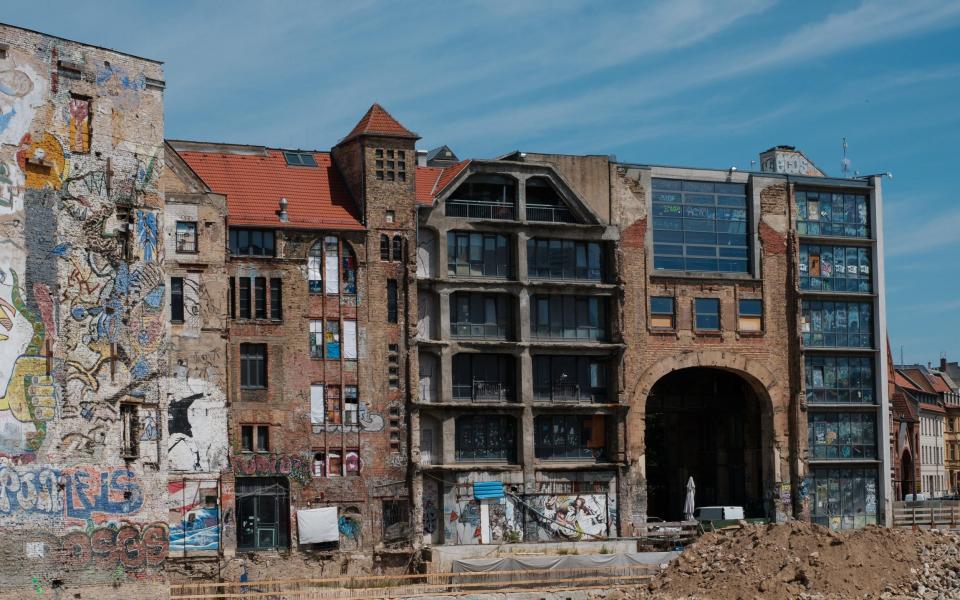When audiences enter the Nuremberg State Theatre four years later, they will find themselves in a cuboid that seats 800 and is covered in lush vegetation. To get there, they must pass through a giant horseshoe-shaped building known as the “Nazi Coliseum,” one of the largest structures left from the party’s massive construction spree of the 1930s, where millions gathered for open-air rallies to applaud Hitler’s plans for domination and destruction.
This month, the city of Nuremberg announced that the opera’s temporary residence since 2021 would be given a permanent home in the Congress Hall courtyard, worth £70m, as part of a major project funded primarily by the state of Bavaria, the federal government and the European Union. The decision has created tension between those who believe the blemished buildings could be put to good use and those who want them to be left as memorials or demolished.
“Some might say that this is something that shouldn’t be happening there, that high culture shouldn’t be in a place where the Nazis made their most barbaric speeches,” says Tobias Reichard, director of the Ben-Haim Research Center (BHRC) at the Munich University of Music and Theatre.
He takes a different view. Working at the BHRC, which is located in the Führerbau (or “Führer’s building”, which was used extensively by Hitler), means Reichard knows first-hand what it is like to spend every day inside walls that are “very contaminated” by history. He thinks the division over the new plans, which one conservative German newspaper called “cowardly”, raises the question: “What are we going to do with this Nazi past and how relevant is it today?”
The Nuremberg Rally Grounds were designed by Hitler’s architect Albert Speer, and Ludwig and Franz Ruff were responsible for the Congress Hall within. Inspired by the Colosseum in Rome and originally planned to reach 230 ft, the structure was only built to about half that height before work was halted at the outbreak of war. It remained largely unused since the mid-1940s.

According to state director Jens-Daniel Herzog, the opera house will serve as a “permanent exorcism” of what was there before – Reichard believes it is useful in ensuring that the building’s roots are never forgotten. Herzog said the decision was “a wonderful sign because it shows us that Nuremberg not only has ideas, but also the courage to move into the future. This gives us a lot of hope for future development potential.”
But others are less enthusiastic, calling the project “very dubious” — including Michael Steinberg, a professor of music and German studies at Brown University. “There’s a huge shadow cast over a permanent opera house in this kind of context,” he says. He believes that shadow would touch both the art and the institution, and both would potentially suffer as a result.
“You have this very charged building…it played a central role in the spread of Nazism. So it’s a very powerful kind of alchemy,” he says. “Either as a viewer, I’m asked to ignore and suppress the obvious reality around me, or I’m asked to have a very disorienting experience.”
He also sees “a broader problem of repurposing such a space for pleasure, and in a way I can see that it might be a more queasy problem when light Italian opera is staged. In other words, are they going to stage The Barber of Seville in a place so spooky and so loaded with history?” The tarnishing of the building – and the tarnishing of everything in it – “is inevitable – and the question is, what good does that do to opera culture in general?”
This raises another issue. As Germany has been reckoning with its old buildings for decades — including turning the former prison Tacheles into a commercial art gallery; the Nazi holiday camp Prora into luxury apartments; and the Saalecker Workshops, home of one of the party’s leading architects, Paul Schultze-Naumburg, into a design school — the opera also bears traces of the country’s past.


This is – inevitably – based on Hitler, an avowed fan who recounted in his 1925 autobiography Mein Kampf that he had seen a life-changing performance of Wagner’s Lohengrin when he was 12. Hitler attended operas almost every day during the four years he spent in Vienna in his early twenties; he had Richard Wagner’s four-and-a-half-hour epic Die Meistersinger von Nürnberg performed at the Berlin State Opera in 1933 to announce the founding of the Third Reich (the company was chosen by Hitler himself); and the following year he considered the art form so important that he ordered the reconstruction of the Nuremberg Opera House. A signed manuscript of Wagner’s Rienzi is reported to have found its way into the bunker where the Führer committed suicide.
In addition to his personal interests, opera also proved a useful political tool. “The Nazis were, of course, aware of music’s potential as a propaganda tool, and they made great use of it,” says Reichard, co-author of Hitler. Power. Opera: Propaganda and Musical Theatre in Nuremberg — primarily through Wagner, whom Hitler forever entwined with his own political aims. The composer, who died 50 years before the founding of the Third Reich, made no secret of his anti-Semitism (including an essay called On Jewishness in Music, which decried the influence of the “essence” of the Jews on the art form); his works, focused on preserving German culture, seemed to Hitler to be theatrical music for his own views. (In 1949, one of Hitler’s chief critics, Thomas Mann, wrote that “it’s all in Wagner’s boasting, his constant lecturing, his desire to monologue on every possible subject, his indescribable rudeness — all a role model for Hitler — there’s certainly a lot of ‘Hitler’ in Wagner.”)
Still, Steinberg, who co-curated a Wagner exhibition at the German Historical Museum in Berlin two years ago, says, “The Nazis were not Wagner’s fault.” “But the Nazis were very powerful emotional manipulators, and in that he has something in common with Wagner.” Manuel Brug, opera critic for the German newspaper Die Welt, says Wagner is as popular as ever in Germany and believes any opera should be judged on its merits rather than influenced by its context. “This is theater that goes on, and hopefully it’s a world of magic [in an opera] … So when I’m watching in a reclaimed space, I don’t get any dark feelings or see shadows of the past,” he says.


One reason such debates keep coming up, Reichard said, is that Nazi buildings “urgently need to be rebuilt or they will collapse.” Letting them rot won’t work; completely destroying them won’t come cheap, and it won’t silence the group that denies that Nazi atrocities ever happened. Can a consensus be reached?
“How do we proceed? Do we always have to contextualize? What happens if we don’t contextualize?” Reichard says of the puzzles of “guilty” buildings. “It shows us that there are relevant and critical questions that need to be answered.”
Brug adds that a more open memorial site, different from the others, is valuable. “Having something to remember is a necessity, and not just in the dark places of the concentration camps.” He calls the Congress Hall renovation a “win-win situation” because the agreement will remain in effect for at least 25 years, providing a continuity that could help undo what came before.
It won’t be the last time such a debate takes place in Germany – a possibility Reichard welcomes. “Every generation has to decide anew what to do with it. It’s not about our fault – do we feel guilty – but what can we learn from this from today’s perspective? If you ask me, I would never try to end this debate because it is very insightful.”